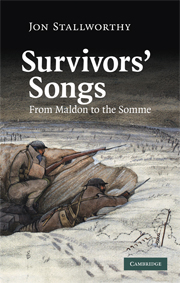Book contents
- Frontmatter
- Contents
- Voice over
- Acknowledgements
- 1 The death of the hero
- 2 Survivors' songs
- 3 England's epic?
- 4 Who was Rupert Brooke?
- 5 Christ and the soldier
- 6 Owen's afterlife
- 7 Owen and his editors
- 8 The legacy of the Somme
- 9 The iconography of the Waste Land
- 10 War and peace
- 11 The fire from heaven
- 12 Henry Reed and the Great Good Place
- 13 The fury and the mire
- Notes
- Index
1 - The death of the hero
Published online by Cambridge University Press: 06 July 2010
- Frontmatter
- Contents
- Voice over
- Acknowledgements
- 1 The death of the hero
- 2 Survivors' songs
- 3 England's epic?
- 4 Who was Rupert Brooke?
- 5 Christ and the soldier
- 6 Owen's afterlife
- 7 Owen and his editors
- 8 The legacy of the Somme
- 9 The iconography of the Waste Land
- 10 War and peace
- 11 The fire from heaven
- 12 Henry Reed and the Great Good Place
- 13 The fury and the mire
- Notes
- Index
Summary
‘Poetry’, Wordsworth reminds us, ‘is the spontaneous overflow of powerful feelings’, and there can be no area of human experience that has generated a wider range of powerful feelings than war: hope and fear; exhilaration and humiliation; hatred – not only for the enemy, but also for generals, politicians, and war-profiteers; love – for fellow soldiers, for women and children left behind, for country (often) and cause (occasionally).
Man's early war-songs and love-songs were generally exhortations to action, or celebrations of action, in one or other field, but no such similarity exists between what we now more broadly define as love poetry and war poetry. Whereas most love poems have been in favour of love, much – and most recent – war poetry has been implicitly, if not explicitly, anti-war. So long as warrior met warrior in equal combat with sword and lance, poets could celebrate their courage and chivalry, but as technology put ever-increasing distance between combatants and, then, ceased to distinguish between combatant and civilian, poets more and more responded to ‘man's inhumanity to man’. Not that heroic societies were oblivious to the domestic consequences of their heroes' ‘brain-spattering, windpipe-slitting art’. The Iliad ends with Andromache watching from the walls of Troy, as her husband's broken body is dragged away behind his killer's chariot: ‘she mourned, and the women wailed in answer’. Similarly, as the hero's funeral pyre is lit at the close of the Old English epic, written 1,500 years later,
A Geat woman too sang out in grief;
with hair bound up, she unburdened herself
of her worst fears, a wild litany
of nightmare and lament: her nation invaded,
enemies on the rampage, bodies in piles,
slavery and abasement. Heaven swallowed the smoke.
- Type
- Chapter
- Information
- Survivors' SongsFrom Maldon to the Somme, pp. 1 - 17Publisher: Cambridge University PressPrint publication year: 2008



